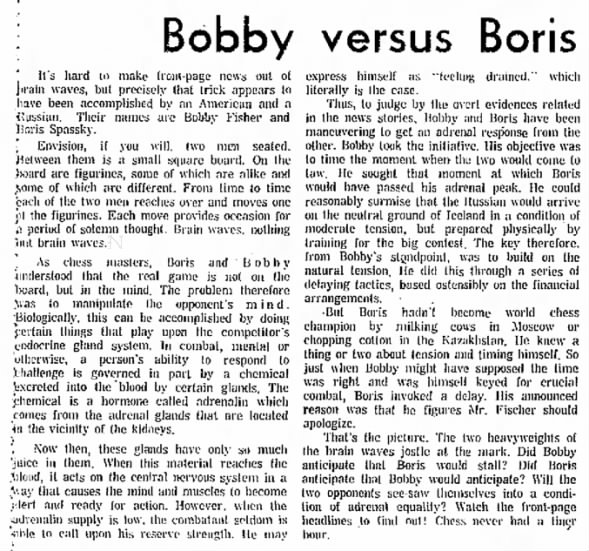The Columbus Telegram Columbus, Nebraska Wednesday, July 12, 1972 - Page 7
Bobby versus Boris
It's hard to make front-page news out of brain waves, but precisely that trick appears to have been accomplished by an American and a Russian. Their names are Bobby Fischer and Boris Spassky.
Envision, if you will, two men seated. Between them is a small square board. On the board are figurines, some of which are alike and some of which are different. From time to time each of the two men reaches over and moves one of the figurines. Each move provides occasion for a period of solemn thought. Brain waves, nothing but brain waves.
As chess masters, Boris and Bobby understood that the real game is not on the board, but in the mind. The problem therefore was to manipulate the opponent's mind. Biologically, this can be accomplished by doing certain things that play upon the competitor's endocrine gland system. In combat, mental or otherwise, a person's ability to respond to challenge is governed in part by a chemical excreted into the blood by certain glands. The chemical is a hormone called adrenalin which comes from the adrenal glands that are located in the vicinity of the kidneys.
Now then, these glands have only so much juice in them. When this material reaches the blood, it acts on the central nervous system in a way that causes the mind and muscles to become alert and ready for action. However, when the adrenalin supply is low, the combatant seldom is able to call upon his reserve strength. He may express himself as “feeling drained” which literally is the case.
Thus, to judge by the overt evidences related in the news stories, Bobby and Boris have been maneuvering to get an adrenal response from the other. Bobby took the initiative. His objective was to time the moment when the two would come to taw. He sought that moment at which Boris would have passed his adrenal peak. He could reasonably surmise that the Russian would arrive on the neutral ground of Iceland in a condition of moderate tension, but prepared physically by training for the big contest. The key therefore, from Bobby's standpoint, was to build on the natural tension. He did this through a series of delaying tactics, based ostensibly on the financial arrangements.
But Boris hadn't become world chess champion by milking cows in Moscow or chopping cotton in the Kazakhstan. He knew a thing or two about tension and timing himself. So just when Bobby might have supposed the time was right and was himself keyed for crucial combat, Boris invoked a delay. His announced reason was that he figures Mr. Fischer should apologize.
That's the picture. The two heavyweights of the brain waves jostle at the mark. Did Bobby anticipate that Boris would stall? Did Boris anticipate that Bobby would anticipate? Will the two opponents see-saw themselves into a condition of adrenal equality? Chess never had a finer hour.
 Bobby versus Boris 12 Jul 1972, Wed The Columbus Telegram (Columbus, Nebraska) Newspapers.com
Bobby versus Boris 12 Jul 1972, Wed The Columbus Telegram (Columbus, Nebraska) Newspapers.com
























